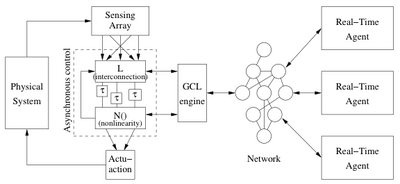Control Design for Cyberphysical Systems Using Slow Computing: Difference between revisions
From Murray Wiki
Jump to navigationJump to search
No edit summary |
No edit summary |
||
| (9 intermediate revisions by the same user not shown) | |||
| Line 1: | Line 1: | ||
[[Image:slowncs-arch.png|right|400px]] | |||
This project seeks to develop new, systematic methods for the design of | This project seeks to develop new, systematic methods for the design of | ||
control systems that can work in the presence of slow computing | control systems that can work in the presence of slow computing | ||
| Line 7: | Line 8: | ||
substrate. This project is supported by the National Science Foundation (NSF), award number 0931746. | substrate. This project is supported by the National Science Foundation (NSF), award number 0931746. | ||
<br clear=both> | |||
{| width=100% | {| width=100% | ||
|- valign=top | |- valign=top | ||
| Line 12: | Line 14: | ||
* {{Andrea Censi}} | * {{Andrea Censi}} | ||
* {{Shuo Han}} | * {{Shuo Han}} | ||
| Past participants | |||
* Javad Lavaei | * Javad Lavaei | ||
* Somayeh Sojoudi | * Somayeh Sojoudi | ||
* Andrew Straw | * Andrew Straw | ||
|} | |} | ||
| Line 21: | Line 23: | ||
* Develop an ''architecture'' for control using slow computing | * Develop an ''architecture'' for control using slow computing | ||
* Develop new theory and and tools for design of controller for cyberphysical systems that scale to slow computing | * Develop new theory and and tools for design of controller for cyberphysical systems that scale to slow computing | ||
* Demonstrations of the | * Demonstrations of the methodology on university scale experiments in micro-vehicles. | ||
== Publications == | == Publications == | ||
* [http://www.cds.caltech.edu/~murray/papers/2011j_chm12-icra.html Fault detection and isolation from uninterpreted data in robotic sensorimotor cascades], Andrea Censi, Magnus Håkansson and Richard M. Murray. Submitted, 2012 International Conference on Robotics and Automation (ICRA). | |||
* [http://www.cds.caltech.edu/~murray/papers/2011i_cm12-icra.html Learning diffeomorphism models of robotic sensorimotor cascades], Andrea Censi and Richard M. Murray. Submitted, 2012 International Conference on Robotics and Automation. | |||
* [http://www.cds.caltech.edu/~murray/papers/2011f_cm11-iros.html A group-theoretic approach to formalizing bootstrapping problems], Andrea Censi and Richard M. Murray. 2011 International Conference on Intelligent Robots and Systems (IROS). | |||
* [http://www.cds.caltech.edu/~murray/papers/2011d_cm11-icdl.html Uncertain semantics, representation nuisances, and necessary invariance properties of bootstrapping agents], A. Censi and R. M. Murray. IEEE International Conference on Development and Learning and Epigenetic Robotics (ICDL/EpiRob), 2011. | |||
* [http://www.cds.caltech.edu/~murray/papers/2010o_cm11-icra.html Bootstrapping bilinear models of robotic sensorimotor cascades], Andrea Censi and Richard M. Murray. 2011 International Conference on Robotics and Automation (ICRA). | |||
* {{hcsm10-iros}} | * {{hcsm10-iros}} | ||
* {{lsm10-acc}} | * {{lsm10-acc}} | ||
* {{chfm09-cdc}} | * {{chfm09-cdc}} | ||
* {{hcsm09-icra}} | |||
== Additional Information == | == Additional Information == | ||
* [http://www.cds.caltech.edu/~murray/proposals/nsf09-cps.pdf Project proposal (Feb 2009)] | * [http://www.cds.caltech.edu/~murray/proposals/nsf09-cps.pdf Project proposal (Feb 2009)] | ||
[[Category:Completed projects]] | |||
{{#set: agency=NSF | end date = 2013}} | |||
Latest revision as of 02:38, 26 November 2015

This project seeks to develop new, systematic methods for the design of control systems that can work in the presence of slow computing elements. The development of such an architecture has the possibility of providing new ways of integrating control into systems where large amounts of fast computation are not easily available, either due to limitations on power, physical size or choice of computing substrate. This project is supported by the National Science Foundation (NSF), award number 0931746.
Current participants:
|
Past participants
|
Objectives
- Develop an architecture for control using slow computing
- Develop new theory and and tools for design of controller for cyberphysical systems that scale to slow computing
- Demonstrations of the methodology on university scale experiments in micro-vehicles.
Publications
- Fault detection and isolation from uninterpreted data in robotic sensorimotor cascades, Andrea Censi, Magnus Håkansson and Richard M. Murray. Submitted, 2012 International Conference on Robotics and Automation (ICRA).
- Learning diffeomorphism models of robotic sensorimotor cascades, Andrea Censi and Richard M. Murray. Submitted, 2012 International Conference on Robotics and Automation.
- A group-theoretic approach to formalizing bootstrapping problems, Andrea Censi and Richard M. Murray. 2011 International Conference on Intelligent Robots and Systems (IROS).
- Uncertain semantics, representation nuisances, and necessary invariance properties of bootstrapping agents, A. Censi and R. M. Murray. IEEE International Conference on Development and Learning and Epigenetic Robotics (ICDL/EpiRob), 2011.
- Bootstrapping bilinear models of robotic sensorimotor cascades, Andrea Censi and Richard M. Murray. 2011 International Conference on Robotics and Automation (ICRA).
- A bio-plausible design for visual pose stabilization, Shuo Han, Andrea Censi, Andrew D Straw, Richard M Murray. IEEE/RSJ International Conference on Intelligent Robots and Systems (IROS), 2010.
- Simple Delay-Based Implementation of Continuous-Time Controllers, Javad Lavaei, Somayeh Sojoudi and Richard M. Murray. American Control Conference, 2010.
- A bio-plausible design for visual attitude stabilization, Andrea Censi, Shuo Han, Sawyer B Fuller, Richard M Murray. Conference on Decision and Control (CDC), 2009.
- A Real-Time Helicopter Testbed for Insect-Inspired Visual Flight Control, Shuo Han, Andrew D Straw, Michael H Dickinson, Richard M Murray. International Conference on Robotics and Automation (ICRA), 2009.